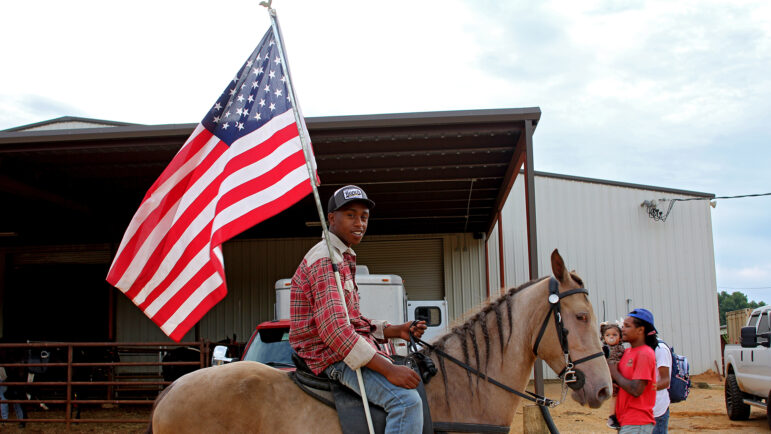By Danny McArthur/Gulf States Newsroom & Maya Miller/Gulf States Newsroom
In Northeast Mississippi, horse trailers and pickup trucks carefully traversed the gravel lot of the Pontotoc County Agri-Center as evening fell on Juneteenth.
More than 100 people would soon filter into the Agri-Center for the inaugural Pontotoc Juneteenth Horse Show for A Step Above Horse Riding Club, a group created by Black riders. As they trickled in, half a dozen horses warmed up in various pens, and a few older cowboys showed out, making their horses prance and race from the East lot around the open fields.
Riders pinned numbers to the backs of each other’s shirts that were starched and tucked into faded blue denim. A young girl took her time in braiding her horse’s mane, securing it with pink rubber bands.
At one minute to 7 p.m., an announcer took to the loudspeaker, and a singer belted out the National Anthem. A rider, who identified himself as JayBo, then hoists the American flag on a pole that he’s shoved down into his boot and turns for a slow ride into the center of the arena to kick off the show.
For more than two hours, participants competed in a long list of competitions, from barrel racing to padded racking. These horse shows aren’t new for North Mississippi. For decades, local Black cowboys have hosted them weekly for a good chunk of the year as a way of building community with each other.
Wednesday’s show, however, has the distinction of falling on Juneteenth — a now-national holiday dedicated to the day that the last enslaved people were freed in Texas: June 19, 1865. It’s historic because though the Emancipation Proclamation freed slaves in Confederate strongholds, including Texas, in January 1863, it would be two years before people there received their freedom. They were the last to know.
Now, Juneteenth is celebrated all over the country, with parades, pageants, block parties and, in Pontotoc, horse shows.
The Gulf States Newsroom visited the small farming community to ask the Black cowboys and cowgirls in attendance what Juneteenth means to them.
Barry Golden, Golden Stables Pontotoc
“That’s the day that the slaves were freed. It’s a really important day. A lot of people didn’t know what it was for, but that’s what it is. I would like to support that.”
Barry Golden
Sonny Shelton, A Step Above Horse Riding Club
“When you look back in history, it means a lot to our race of people. Go and study (your) history and see how things were, how things are today and understand exactly why we and people all around the world are celebrating Juneteenth.”
Sonny Shelton
Willie Johnson, A Step Above Horse Riding Club
“Today is our day for our freedom. This is officially our July 4th. It has more meaning that we really were freed on Juneteenth instead of July 4th — like they say everyone else was. I’m just trying to celebrate my heritage and let it be known. We try to spread the word, even though in 2021, when they officially made it a holiday, a lot of people didn’t know. ‘What’s Juneteenth?’ That’s when we get into our teaching mode. You don’t just teach them one day. We teach them through the year and let them know about our Black pride.”
Willie Jones
Dre Gorman, Gorman Stables
“When you’re riding the horses, you pretty much forget about all your problems and some of the things you’re going through. It’s a blank peace of mind, and I imagine that’s how some of our ancestors felt when they were let off the plantations and were finally free. That’s what it means to us. We all come together, fellowship and enjoy the horses.”
Dre Gorman
Brenna-Kate Keys and Khyanna Moore
“We are just keeping the tradition going, having fun with it and living our Black life.”
Brenna-Kate Keys and Khyanna Moore
Jahvon Armstead and Hot Girl
“It gives me peace. I deal with horses every day. I don’t want to do anything else but deal with horses. It’s my life. A lot of people don’t get a chance to have horses like these and be around horses every day and stay out of trouble. It keeps me out of trouble. I try to get little kids to ride and stay out of trouble with horses.”
Jahvon Armstead
This story was produced by the Gulf States Newsroom, a collaboration between Mississippi Public Broadcasting, WBHM in Alabama, WWNO and WRKF in Louisiana and NPR.

